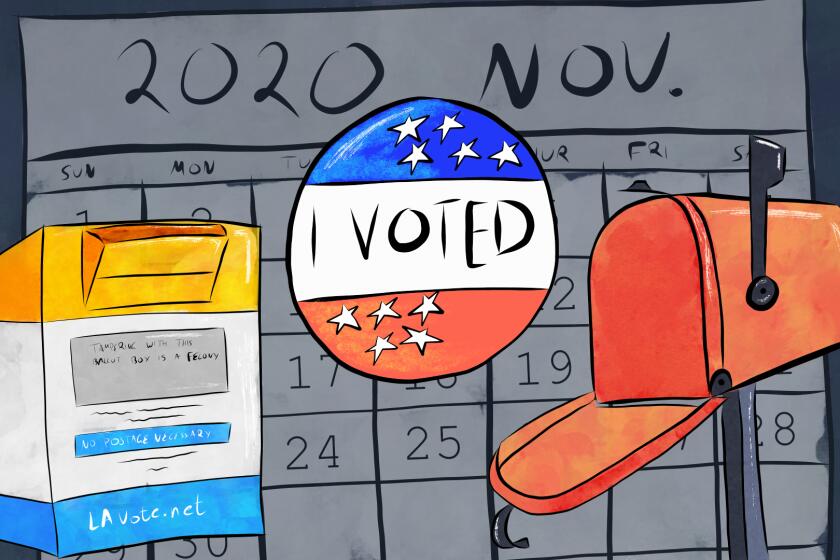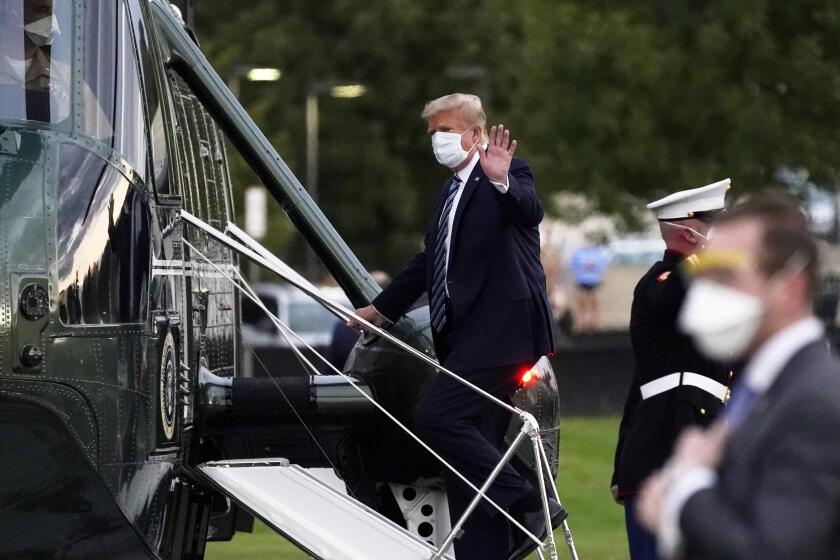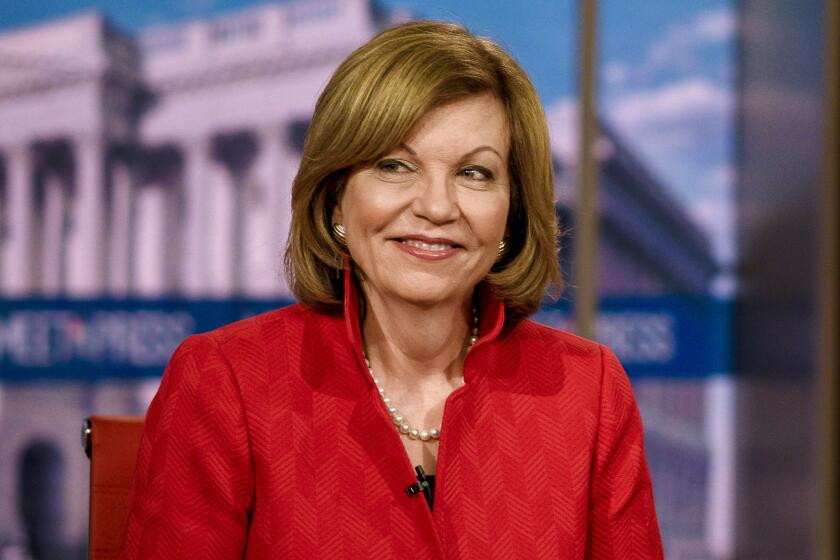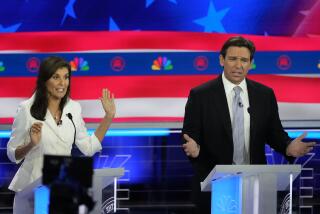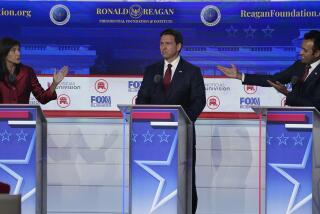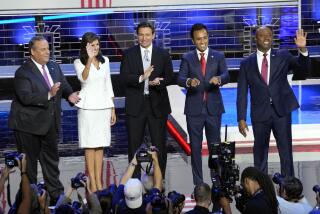Vice presidential debate: Kamala Harris and Mike Pence meet Wednesday. Here’s what to expect
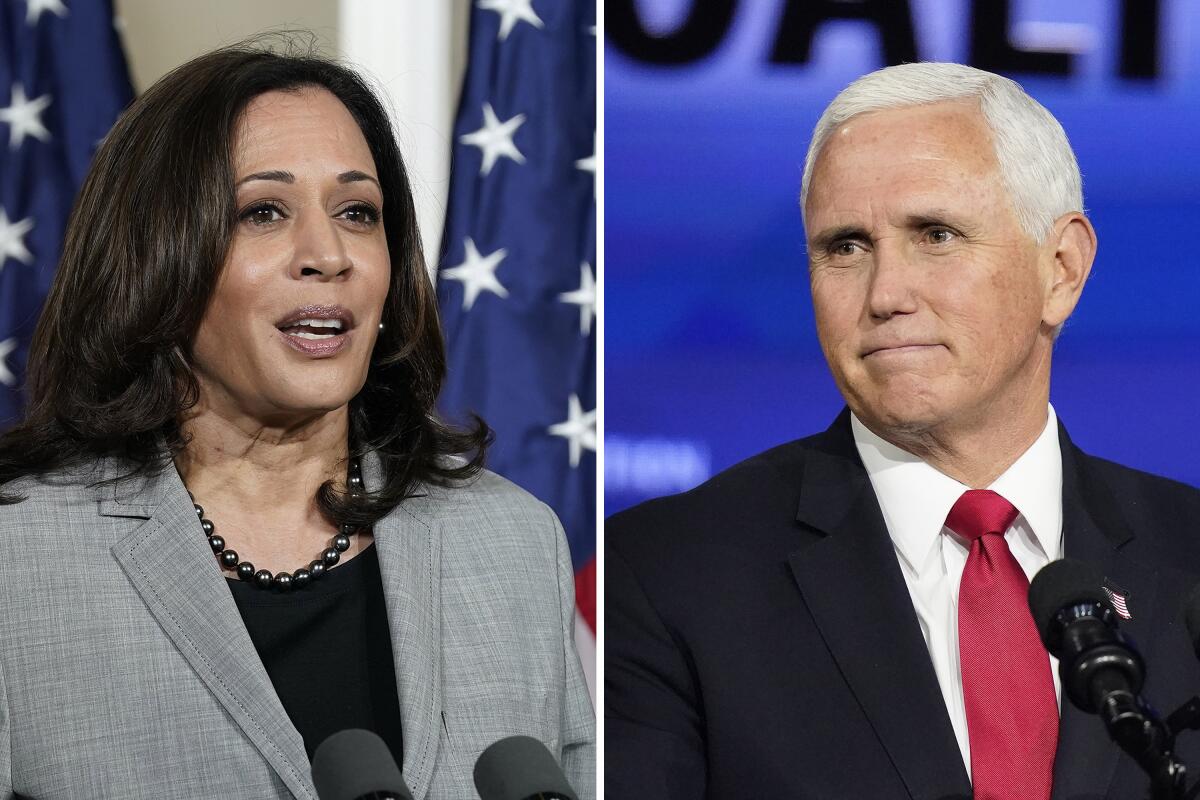
President Trump’s brief hospitalization for COVID-19 could raise the stakes for Wednesday’s debate between Vice President Mike Pence and California Sen. Kamala Harris.
Historically, vice presidential debates — like an opening act ahead of the main event — have drawn significantly lower viewership. But with Trump’s illness from COVID-19 and his age, 74, and that of Democratic presidential candidate Joe Biden, 77, there could be more interest as speculation increases over whether Pence or Harris could wind up as president.
With the fate of the next two presidential debates unknown, it also puts pressure on Pence and Harris to make their case.
How do you vote by mail? What issues are on the local ballot in Los Angeles County? Follow the latest news on the presidential race. Get information you need on the upcoming election.
Here’s what you need to know ahead of the debate:
What time is the debate?
The debate starts at 6 p.m. Pacific time on Wednesday and will last 90 minutes, with no commercial breaks. It will be held at the University of Utah in Salt Lake City.
Trump pronounces himself fit, as his press secretary, Kayleigh McEnany, and other members of his team announce they’ve tested positive for coronavirus.
How do I watch?
Major networks — ABC, CBS, CNN, Fox News and NBC — will air the debate on TV and stream it on their apps and websites. C-SPAN will air it on TV, its website and its YouTube channel.
Who is moderating?
Susan Page, the Washington bureau chief at USA Today, will moderate the debate.
The majority of moderators in general election debates the last few decades have been prominent broadcast journalists, according to Pew Research Center, with the exception of James Hoge, who was the editor in chief of the Chicago Sun-Times when he moderated the 1976 vice presidential debate between Sens. Walter Mondale and Bob Dole.
The USA Today Washington bureau chief will be in charge when Vice President Mike Pence and Sen. Kamala Harris face off on Wednesday.
Why is there only one vice presidential debate? Do they matter less?
Definitely.
There has never been a vice presidential debate that has decided the outcome of a presidential race.
They are also watched significantly less than are the presidential debates. In 2016, 37 million people watched the debate between Pence and Sen. Tim Kaine, compared with 66.5 million viewers of the lowest-rated of the presidential debates between Trump and Hillary Clinton, according to Pew Research Center.
The exception, according to Pew, was in 2008 when more people watched the vice presidential debate between Biden and then-Alaska Gov. Sarah Palin than watched any of the debates between Barack Obama and John McCain.
Some have even called for the Commission on Presidential Debates to do away with vice presidential debates entirely.
But this particular matchup has actually gained significance in light of Trump being hospitalized and given steroids and experimental treatment for COVID-19.
“This is going to be well observed, I think,” said Frank J. Fahrenkopf Jr., a co-chairman of the debate commission.
So, who are Pence and Harris?
Pence, 61, already knew Washington when he became vice president. He had served 12 years in Congress before being elected governor of Indiana in 2012.
Pence has described himself as “a Christian, a conservative and a Republican, in that order.” As head of the Trump administration’s coronavirus task force, Pence will likely face questions about the response to COVID-19, which has killed more than 210,000 Americans.
Harris, 55, is the first Black woman and first Asian American to run nationally on a major-party ticket. She was elected to the U.S. Senate in 2016 after two terms as California attorney general.
Last year, during her 10-month presidential campaign, one of the most notable moments was Harris lacing into Biden in the first Democratic debate over his opposition to mandatory school busing in the 1970s.
Winks, burns and other moments from past veep debates
Probably the biggest burn in debate history came in 1988, when second-term Republican Sen. Dan Quayle faced off against Sen. Lloyd Bentsen, the Democratic vice presidential candidate. Quayle attempted to liken his own Senate experience to John F. Kennedy’s.
“Senator, I served with Jack Kennedy. I knew Jack Kennedy. Jack Kennedy was a friend of mine,” Bentsen said. “Senator, you are no Jack Kennedy.”
In 1992, there was Adm. James Stockdale, Ross Perot’s running mate. Stockdale, who had been a prisoner of war in Vietnam, tried to make light of his lack of experience in politics. “Who am I? Why am I here?” he asked.
And who can forget Palin’s winking? She winked at least six times at 70 million viewers during the debate against Biden in 2008. (Palin also asked Biden at the start of the debate if she could call him “Joe.”)
What safety precautions are being taken?
There were concerns raised about Pence participating in the debate. Pence met with the president in the Oval Office last week — days before Trump tested positive for coronavirus infection.
In a memo Tuesday, Pence’s physician said the vice president had remained healthy and had not had any COVID-19 symptoms and did not need to quarantine. He is being tested daily, and his test Tuesday afternoon was negative, Navy Lt. Cmdr. Dr. Jesse Schonau said.
“Pence is not a close contact with any individuals who have tested positive for COVID-19, including President Donald J. Trump and senior members of the White House administration,” Navy Lt. Cmdr. Dr. Jesse Schonau said in the memo. He “does not need to quarantine.”
Last week, the debate commission said it would increase the distance between the candidates’ chairs to 12 feet. On Monday it said it would use plexiglass barriers after a request from the Biden campaign.
Pence’s team mocked the request that night, and said Tuesday it was rejecting barriers near the vice president. But Tuesday night, Fahrenkopf said Pence agreed to leave the plexiglass up on his side if it made Harris feel safer.
The Cleveland Clinic, the health advisor to the commission, had advised the panel in favor of using the barriers, Fahrenkopf said.
Some experts have called for the debates to go virtual; others have suggested moving them outdoors.
“You reduce the risk of transmission almost 20 times when you’re outdoors,” said Dr. Neha Nanda, medical director of infection prevention and a healthcare epidemiologist at the USC Keck School of Medicine. “In my mind, it’s definitely worth considering.”
If debates continue indoors, Nanda said, it’s important to ensure that there is optimal ventilation inside and that everyone has been tested.
During the Sept. 29 presidential debate in Ohio, those allowed inside tested negative for COVID-19 before entering, according to the Cleveland Clinic.
There were several requirements in place, including temperature checks, hand sanitizing, social distancing and masking. Although attendees entering the debate hall were masked, the clinic stated, some removed their face coverings once they were seated, including Trump’s family.
This time, anyone who takes off their mask in the debate hall — even candidates’ family members — will be removed, according to Fahrenkopf.
Trump’s behavior since his diagnosis should be the final blow to the pundit guessing game of whether anything would cause him to change his ways.
When is the next debate?
If it continues as planned, the second presidential debate will be Oct. 15 at the Adrienne Arsht Center for the Performing Arts in Miami. A third presidential debate is set for Oct. 22 at Belmont University in Nashville.
“Consideration for the next two are going to depend a lot on how the president’s health is,” Fahrenkopf said.
On Tuesday morning, Trump tweeted, “I am looking forward to the debate on the evening of Thursday, October 15th in Miami. It will be great!”
That afternoon, Biden told reporters that if Trump “still has COVID, we shouldn’t have a debate.”
Even if Trump is deemed to be healthy enough to debate, Fahrenkopf said, it is unclear whether it would be safe for the president to fly. Trump could be contagious for up to 10 days from when he arrived back to the White House, according to the U.S. Centers for Disease Control and Prevention.
“Maybe we’ll have to do it virtually; we just don’t know,” Fahrenkopf said. “We’re not there yet. We want to get this one behind us.”
More to Read
Get the L.A. Times Politics newsletter
Deeply reported insights into legislation, politics and policy from Sacramento, Washington and beyond. In your inbox three times per week.
You may occasionally receive promotional content from the Los Angeles Times.

